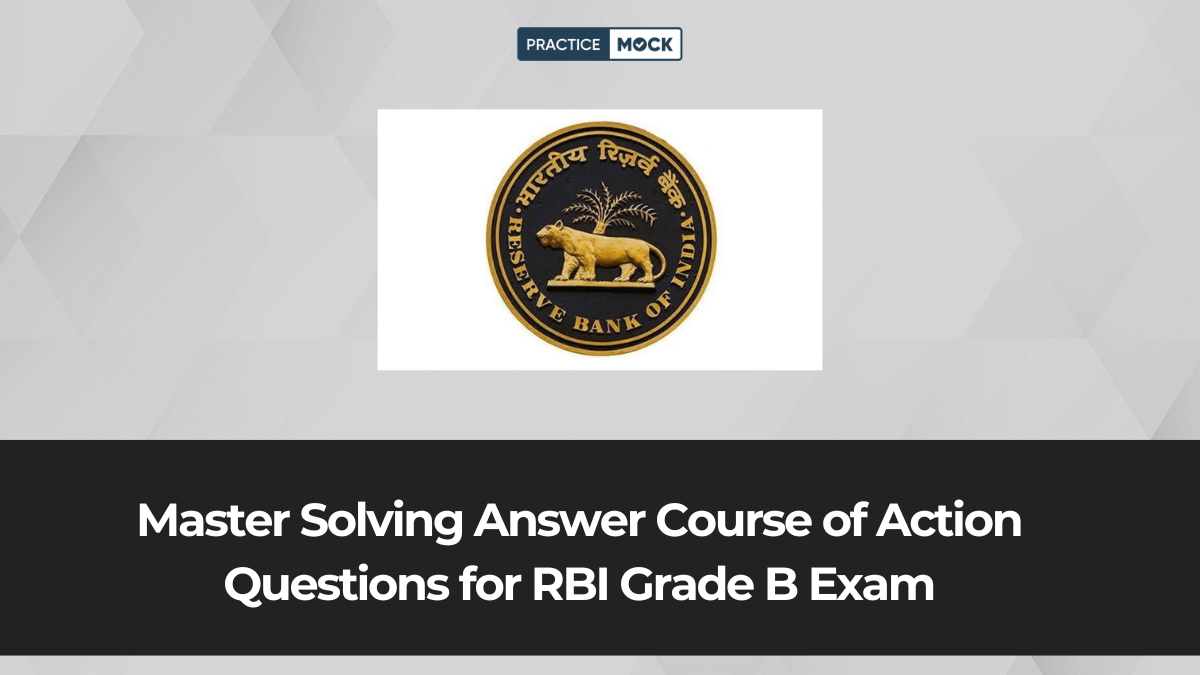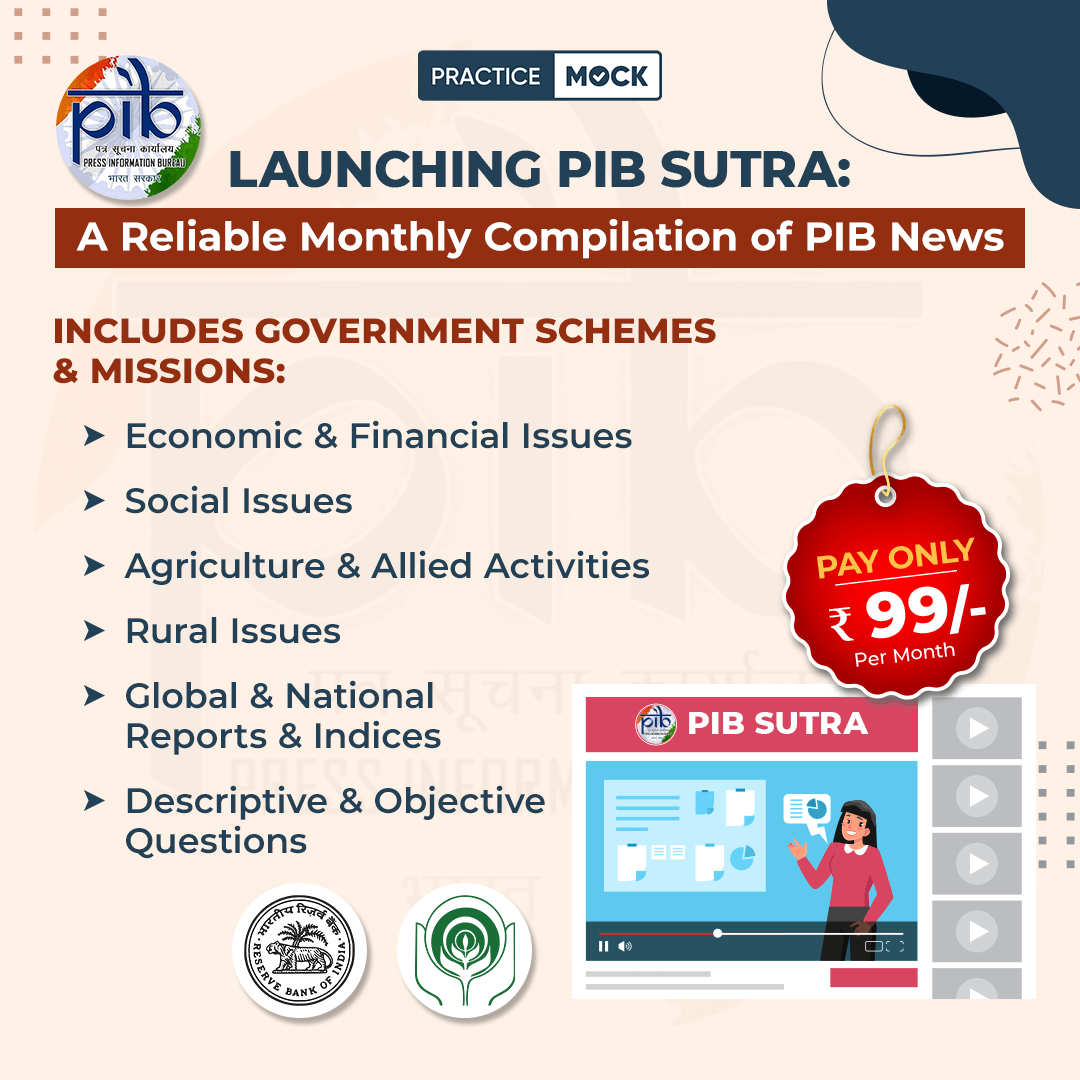In the RBI Grade B Phase 1 exam, among the reasoning topics, Course of Action questions test a candidate’s ability to think logically and make sound decisions. These questions appear under the Reasoning section and often confuse students due to their abstract nature. You can expect around 3-5 questions. That comes to 5 to 10 percent of the overall reasoning section. Although these questions may not have a very high weightage, they are often time-consuming and require logical thinking. Mastering this topic can greatly improve your overall score and boost your confidence. In this blog, we’ll share with you the tips and supply you with the ideal practice material and sample questions with solutions to help you solve these questions quickly and accurately during the exam.
Tips to Master Course of Action Questions Quickly
Many students struggle with Course of Action questions because they overthink or misjudge the logic. The tips below will help you understand the concept clearly and avoid common mistakes. Follow these strategies to improve speed and accuracy.
1. Understand the Core Concept
Before answering, know what a “course of action” actually means — a suggested step to solve a problem.
- Read the passage carefully to spot the main issue
- Identify whether the action directly addresses the problem
- Eliminate extreme or vague actions
- Prefer logical, practical, and legal actions
- Avoid emotional or biased decisions
2. Practice with Previous Year Papers
The more patterns you see, the easier it becomes to predict what examiners expect.
- Start with RBI Grade B previous year questions
- Note recurring logic and common traps
- Practice similar questions from other bank exams
- Track your accuracy and mistakes
- Revisit tricky questions after a few days
3. Don’t Assume Extra Information
Only use what’s given in the passage — no assumptions.
- Stick strictly to the facts mentioned
- Don’t imagine background stories or reasons
- Avoid applying personal opinions
- Trust the logical flow of the passage
- Keep emotions out of judgment
4. Improve Decision-Making Speed
Quick thinking is key during the actual exam.
- Set a timer while practicing questions
- Try to finish each question within 60–90 seconds
- Mark doubtful ones and revisit them later
- Don’t spend too much time on one question
- Review incorrect answers to avoid repeating mistakes
5. Focus on Practical Solutions
Feasible actions are always preferred over ideal ones.
- Look for realistic and implementable steps
- Ignore suggestions that sound too ambitious
- Prefer government or legal solutions over personal ones
- Choose actions that help the majority
- Avoid suggestions with unclear outcomes
Course of Action Questions
Directions: In the question given below, a passage is given, followed by three statements which may or may not be a suitable course(s) of action. Select the correct combination of statements that follow as a suitable course(s) of action.
Passage 1:
One of the most common problems faced by residents of Mumbai during the monsoon season is flooding of sewage water into homes, especially in low-lying areas. Usually, the complaints of residents fall on deaf ears, but this year the municipal corporation has become proactive, primarily due to the approaching elections. The corporation has hired a consultancy firm to conduct a review of the problem and suggest appropriate solutions.
Statements:
- People living in low lying areas should be shifted to higher locations.
- The drainage system, especially around residential colonies, should be improved.
- Roads should be rebuilt and the potholes should be filled.
Options:
- (A) Only 1
- (B) 1 and 2
- (C) Only 2
- (D) 2 and 3
- (E) Only 3
Ans: C
Explanation:
The passage states that residents of Mumbai frequently suffer flooding in their homes during monsoon.
1 is not a logical course of action. Although the passage states that low-lying areas experience the most flooding, other areas also suffer flooding. Also, shifting people to better locations is at best a temporary solution,n and it does not solve the problem.
2 is a logical course of action. If the drainage system is improved, the flooding can be stopped.
3 is not a logical course of action. The passage states that the problem is flooding of sewage water into homes. Improving the condition of the roads will not solve that problem.
Thus, C is the correct answer.
Passage 2:
A recent survey conducted by the NGO Pratham among students of class 6–8 studying in government schools revealed that 40% of students can’t perform basic mathematical operations taught to students of class 2. 37% of the students could not write more than 2 coherent sentences in English. A whopping 65% could not name more than 5 states of the country. The report has caused shock and anger among the general public.
Statements:
- Steps should be taken to move more and more students from private to government schools.
- Teaching methodology, along with the quality of teachers, should be improved in government schools.
- Students who do not obtain basic minimum marks should not be allowed to progress to higher class.
Options:
- (A) Only 1
- (B) Only 2
- (C) 1 and 2
- (D) 2 and 3
- (E) 1 and 3
Ans: D
Explanation:
The passage states that children of class 6–8 have shown poor educational outcomes in a survey.
1 cannot be a possible course of action. Firstly, transferring students from government schools to private schools might not necessarily lead to better education. Secondly, it will not fix the problem in government schools. Lastly, it might not be possible for everyone to pay the fees of private schools.
2 can be a possible course of action. Improving the teaching methodology and the quality of teachers will improve the quality of education being provided in government schools.
3 can be a possible course of action. Students who have not attained basic qualifying marks should be made to repeat the class.
Thus, D is the correct answer.
Passage 3:
Malnutrition is one of the biggest challenges for India. Time and again, various national and international surveys underline the quantum of the challenge before India. UNICEF report notes that nearly one in three people in India have at least one form of malnutrition and this will increase to one in two by 2025 going by current trends.
Statements:
- The government should ensure that each citizen of India is provided a minimum quantity of ration.
- The government should carry out campaigns to spread awareness about the issue.
- Private companies that aim to tackle this issue should be given government funding.
Options:
- (a) Only 1
- (b) Only 1 and 2
- (c) Only 1 and 3
- (d) Only 2 and 3
- (e) All 1, 2 and 3
Ans: C
Explanation:
The premise talks about the problem of malnutrition.
1 is a suitable course of action as it would help tackle the problem so that no citizen faces the problem of food shortage.
3 is a suitable course of action as it would aim to provide aid to companies that are trying to tackle the issue so that they do not face roadblocks.
2 is incorrect as spreading awareness about the problem of malnutrition would not help to solve the problem. The premise already mentions surveys which underline this issue.
Thus, C is the right answer.
Passage 4:
Prevalence of myths and misconceptions, lack of information and misinformation has hindered the government efforts to achieve full immunisation. This is resulting in outbreaks of various kinds of illnesses, leading to a growing fatality rate among infants, children and expectant mothers in India.
Statements:
- Campaigns should be carried that aim to spread awareness on the importance and benefits of immunisation among the masses.
- Schools should carry out immunisation camps to inoculate children at the school level itself.
- The government should make immunisation free and compulsory for all children.
Options:
- (a) Only 3
- (b) Only 1 and 2
- (c) Only 1 and 3
- (d) Only 2 and 3
- (e) All 1, 2 and 3
Ans: E
Explanation:
The premise talks about how full immunisation has not been achieved due to several barriers.
1 is a suitable course of action as campaigns that spread awareness on the issue would help tackle few of the barriers.
2 is a suitable course of action as an effort taken by schools would help address the issue at its root.
3 is a suitable course of action as free and compulsory immunisation might help ensure that people inoculate their children.
Thus, E is the right answer.
Passage 5:
Flooding is a hallmark of climate change. By their very nature, flooding events are unpredictable and can do substantial damage to communities. Significant floods occur in the UK every few years, so the way flooding is managed can have a major impact on how much damage is done, while poor strategic decisions such as building on historic flood plains can leave new communities vulnerable.
Statements:
- The government of UK should form committees to manage incidents of flooding and provide support to the victims.
- The government of UK should take steps to regulate construction in flood plains.
- Embankments should be built on the banks of the rivers that flood.
Options:
- (a) Only 2
- (b) Only 3
- (c) Only 1 and 3
- (d) Only 2 and 3
- (e) All 1, 2 and 3
Ans: Explanation:
The premise describes a problem – flooding.
1 is a valid course of action as committees targeting to provide relief and support can help reduce the damage caused by the floods.
2 is correct as it talks about regulating construction in flood plains, which is mentioned as a cause of vulnerability.
3 is correct as embankments would prevent the river from flooding.
Thus, E is the right answer.
Takeaway
With the right understanding and regular practice, answering Course of Action questions becomes simple. These tips will help you boost your accuracy and confidence for the RBI Grade B exam.
Click Here to Check PIB Sutra & Master Current Affairs
FAQs
It is a reasoning question that asks what action should follow a given situation.
They appear in the Reasoning section of Phase 1.
Around 3–5 questions can be expected in the exam.
No, you should not assume anything beyond the given information.
Yes, 1/4th marks are deducted for each wrong answer in Phase 1.
- Sign Up on Practicemock for Updated Current Affairs, Free Topic Tests and Free Mini Mocks
- Sign Up Here to Download Free Study Material
Free Mock Tests for the Upcoming Exams
- IBPS PO Free Mock Test
- RBI Grade B Free Mock Test
- IBPS SO Free Mock Test
- NABARD Grade A Free Mock Test
- SSC CGL Free Mock Test
- IBPS Clerk Free Mock Test
- IBPS RRB PO Free Mock Test
- IBPS RRB Clerk Free Mock Test
- RRB NTPC Free Mock Test
- SSC MTS Free Mock Test
- SSC Strenographer Free Mock Test
- GATE Mechanical Free Mock Test
- GATE Civil Free Mock Test
- RRB ALP Free Mock Test
- SSC CPO Free Mock Test
- AFCAT Free Mock Test
- SEBI Grade A Free Mock Test
- IFSCA Grade A Free Mock Test
- RRB JE Free Mock Test
- Free Banking Live Test
- Free SSC Live Test




